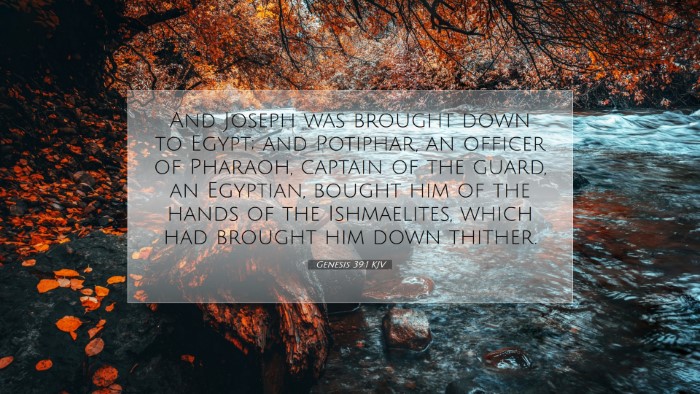Commentary on Genesis 39:1
Genesis 39:1 (NIV): "Now Joseph had been taken down to Egypt. Potiphar, an Egyptian who was one of Pharaoh's officials, the captain of the guard, bought him from the Ishmaelites who had taken him there."
Introduction
This verse marks a significant transition in Joseph's life, illustrating both his misfortune and the unfolding of God's providential plan. It serves as a prelude to the many events in Joseph's life that will lead him from slavery to prominence in Egypt. The commentaries of Matthew Henry, Albert Barnes, and Adam Clarke provide a rich exploration of its theological implications and historical context.
The Context of Joseph's Slavery
Matthew Henry's Insight: Henry emphasizes the sovereignty of God in Joseph's life, noting that though he was sold into slavery, it was part of a divine plan. He points out that Joseph's situation was foreseen by God, and even in the midst of injustice, God's providence is evident.
Albert Barnes' Perspective: Barnes highlights how Joseph’s sale into Egypt fulfilled the dreams he had experienced earlier. He notes that the journey to Egypt was not merely physical but also a significant spiritual ordeal that Joseph endured in preparation for his future leadership.
Adam Clarke's Commentary: Clarke focuses on the character of Potiphar, describing him as a man of high rank and authority in Pharaoh's court, which signals how God was setting the stage for Joseph’s eventual rise to power.
Emphasis on God's Providence
All three commentators agree on the overarching theme of God's providence throughout Joseph's life. Even when circumstances seem dire, God is actively working to steer events toward His ultimate purpose.
- God's Purpose in Adversity: Henry reminds readers that trials can be transformative, guiding believers closer to God's plan.
- Preparation for Greatness: Barnes encourages the belief that Joseph’s experiences were shaping him for future responsibilities and challenges.
- Godly Character Development: Clarke points out that Joseph’s integrity and faithfulness were crucial for his later success, showing that character is often forged in hardship.
The Symbolism of Egypt
The mention of Egypt is significant in the biblical narrative, often symbolizing oppression and sin. However, in God’s divine economy, Egypt becomes a place of refuge and ultimately a backdrop for deliverance.
- Henry's Reflection: He remarks that Egypt represents both a place of trial and a preparation ground for Joseph’s future role as a savior for his family and nation.
- Barnes' Commentary: Barnes elucidates that the journey to Egypt serves as a reminder that God can use even the most unlikely places for His glory.
- Clarke's Analysis: Clarke notes that Joseph's time in Egypt emphasizes God's ability to bring about redemption from even the most bleak circumstances.
The Role of Potiphar
Joseph’s master, Potiphar, is portrayed as a man of authority, which becomes a pivotal factor in Joseph's life in Egypt. Each commentator delves into the implications of this relationship.
- Authority and Influence: Henry views Potiphar not merely as a slave owner but as an instrument in God's plan, providing Joseph with opportunities for growth and development.
- Relationship Dynamics: Barnes discusses how the relationship created an environment where Joseph could demonstrate his leadership skills and faithfulness.
- Divine Setup: Clarke remarks that Potiphar’s position as captain of the guard placed Joseph in a setting that would later facilitate his rise to prominence.
Conclusion
The events captured in Genesis 39:1 illustrate the complexity of human experiences intertwined with divine providence. Joseph's sale into Egypt, while appearing unfavorable, was a crucial turning point that set the foundation for God's plan to unfold in his life. The insights from Henry, Barnes, and Clarke remind us that in times of trial, God's hand is still at work, guiding us toward our purpose, shaping our character, and preparing us for future roles in His grand narrative.


